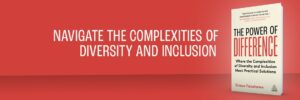 What happens when we start to win the battles we’ve been fighting? When the six of us thought up Stonewall, the project was very well and easily defined. We (I’ll include lesbians because, although not actually mentioned in the law, they shared the reality of discrimination with gay men) were legally unequal. There were specific offences in law aimed at criminalising us in ways that our straight friends and enemies were not.
What happens when we start to win the battles we’ve been fighting? When the six of us thought up Stonewall, the project was very well and easily defined. We (I’ll include lesbians because, although not actually mentioned in the law, they shared the reality of discrimination with gay men) were legally unequal. There were specific offences in law aimed at criminalising us in ways that our straight friends and enemies were not.
We knew the target for our campaign – Parliament; we knew where the support was – gays and lesbians and our friends; and we knew what our weapons were – the appeal to fairness and equality to which we knew the majority of the country would respond positively. So, ready, aim, fire. In the early days of these battles our struggle for equality gave us the bond of common purpose and experience which served us very well. It made absolute sense then to submerge differences in the face of the provocation of a shared offence to liberty and rights. There was a clarity about who we were, the discrimination we were suffering and what we wanted to do about it.
However, as we fought these battles something happened to disturb that simplicity. We started to win. First with public opinion and then in Parliament. Our coherence as a group, forged by the prejudice and the secrecy forced upon us in the past, gave way to a diversity among us that grew from our new freedom. Progress brought the liberty for lesbian and gay people to follow their aspirations and develop their private and public lives and their social and political views as individuals in any way they wanted. The solidarity in the face of discrimination didn’t entirely disappear, because the problem hasn’t completely disappeared. But the assumption of a single group experience could no longer capture the diversity of needs, wants, ambitions, ideas and politics of the individuals within it. The rigidity of any identity category needs to flex with time and success to encompass the increasing differences in people’s public and private lives and in their divergent opinions. Labels shouldn’t contain people. They should be enablers of difference, not prisons of sameness.
Inclusion is now in danger of meaning not that we will create spaces for all voices, but instead “To be inclusive, you have to speak like this, think like this and behave like this. Otherwise, we’ll exclude you”!
The relevance of this now to gay and lesbian people at work is that we exist in these two different places. We are herded, with the very best of intentions, by diversity policies in our workplaces, into the big baggy category of LGBT, with the intention of countering discrimination at work and supporting each other the face of bias where it persists. We are a group with an assumed common interest. We are also increasingly free as individuals to pursue our own aspirations, lives and politics. We’re gay and not gay. Gay doesn’t have to describe every aspect of our life any more. My mother once asked me when I turned up to visit her and my Pa, with (of course) aubergine hair, wearing dungarees and carrying some pink placard, “Why do you have to make such a noise about it all?”. I said “So that one day we don’t have to”. “Oh”, she said, “good point. Do you want a drink?”
It is one of the triumphs of progressive thinking and action that diversity has become the must-have for any modern company. CEOs and HR Directors rightly put their diversity and inclusion policies out into the public domain on their websites as part of their brand and appeal to current and future staff and feel compelled by the urgency of #MeToo and #BlackLivesMatter to show that they are joining in, cracking on and speaking up. This is a Good Thing. However, it has led us to some not such good places. The very diversity policies and action that were supposed to free us as individuals, have ironically become tools of conformity. Inclusion is now in danger of meaning not that we will create spaces for all voices, but instead “To be inclusive, you have to speak like this, think like this and behave like this. Otherwise, we’ll exclude you”! Diversity has bred its own set of orthodoxies. Consequently there is a crisis of dialogue at work (not to mention in wider political and social debates). It’s not just around the question of Stonewall and their approach to self-ID and the law, but also in relation to race and other issues. Our emotions and feelings rightly run high on these questions because they are intensely personal. For exactly the same reason though, we need to redouble our efforts to understand our different views and the reasons for them, rather than cancel or exclude those we disagree with by smearing them as hateful, phobic or illegitimate. We need to encounter and enjoy each other’s differences if we are to collaborate at our best at work. The book is my attempt to give you the research and practical tools to do that.
If diversity and inclusion means anything, it precisely means engaging with all voices, all views, even those with whom you disagree and in the worst cases are hurtful.
One of the lessons I learned from Stonewall, was most extraordinarily demonstrated in the conversation that I have mediated a number of times between Jo Berry whose father was murdered in the Brighton bomb and Patrick Magee who killed him. When they speak together remarkably they don’t seek agreement. You can’t agree about murder. They seek understanding. To hear each other. If they can do it, so can we. If diversity and inclusion means anything, it precisely means engaging with all voices, all views, even those with whom you disagree and in the worst cases are hurtful. Rather than trying to force agreement about everything we each think, we need to find the ways we can understand those differences and work together.
The Power of Difference is a practical guide through the journey of how to do that. It is an argument for conversation rather than shouting, for finding common ground rather than demanding obedience to a single view, for real diversity and true inclusion where spaces are safe for disagreement not from disagreement.
When the Harvard Professor Amy C Edmondson started to research what she termed ‘psychological safety’ she defined it as ‘a climate in which raising a dissenting view is expected and welcomed’. It’s all about creating the atmosphere where you feel you can speak up and where that does not lead to scorn, ridicule or exclusion. The reason this is so significant was revealed in her first major investigation which was to see if there was a correlation between ‘psychological safety’ and medical errors. She and her team discovered that indeed there was. But it was the exact opposite of what they expected. The data seemed to be telling them that psychologically safe teams made more errors. Shocked by this they continued to investigate until the penny dropped. They don’t make more errors. They report more errors. And that way they learned from them.
By imposing whatever ideology we believe in on everyone else in our office is to cut off curiosity and challenge which is the way we learn. As Chimamanda Adichie, the great Nigerian novelist says, our ability to tell our different stories to each other is precisely what makes us human. There is no one way to think and feel to be gay, lesbian, trans, black, Asian, female. There is precisely a diversity of views and experience and arguments. To enrich our experience of each other we need to listen to hear not listen to respond. We can never see the world through another’s eyes, filter it through another’s experience. We will always be approximating, in the hope that we get closer to some kind of truth over time. While we can never know each other, it can be a great joy to go on the journey in order to try. And if we go on that journey, we must do so in the certain knowledge that it will never end. To seek to understand each other’s differences is an essential human challenge. To know that we never will is the human condition. At its heart, that is all diversity is. To appreciate the power of difference. And gays should know that!
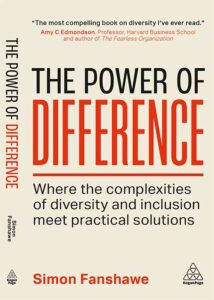
EXTRACT FROM THE POWER OF DIFFERENCE BY SIMON FANSHAWE
One of the first times I became aware of the significance of difference was a day when I was walking to the train station in my last year at university in 1978 in Brighton. I had been studying law for almost three years at Sussex, where I had found a whole host of clues to who I might be in the rest of my life. A year or so before that I had come out. To my friends, who all appeared to know already. To my parents, who wonderfully reassured me of their continuing love. And to the rest of the world, or at least as much of it with which I had so far communicated, who mainly reacted with supreme indifference, occasionally peppered with bursts of hostility.
These were the student days when badges were worn. If you didn’t have a badge or a t-shirt with a slogan in condemnation of apartheid in South Africa or in support of A Women’s Right to Choose, you really were thought to have no opinions at all and absolutely nothing to say. Our political stances were emblazoned on cotton and tin staking our claims to virtue and our constant preparedness for verbal fisticuffs ‘on the side of right’.
That day I was wearing a badge that said something charmingly inviting to the outside, largely heterosexual, world like ‘Scr*w You I’m Gay’. I was getting predictably hostile looks. On reflection over 40 years later, they were probably as much for my aggressive tone that early in the morning as for any kind of antipathy to me being gay. But the stares irked me. Even though I was brimming with the zeal of the newly liberated, they fanned my insecurities. I reached up to unpin the badge from my lapel. At the exact same moment, I glanced over to the other side of the street. A young Black woman was walking in the opposite direction. My hand dropped. I left the badge where it was. It was my naïve tribute to the fact that she couldn’t hide. However proud or not she felt of being Black, she couldn’t pop back into a temporary closet and conceal her colour. Even though the looks she would receive pretty much every moment of every day would mark her out as different in a majority White country that, as many people of colour have written, might well have made her shiver inside with discomfort.
That moment has stayed with me. That tiny unspoken moment. Because it was a realization of what can happen when you encounter difference. I saw diversity and realized how it could enrich my understanding of life. Finding my way through the world didn’t mean wearing badges announcing what I thought. It meant living my values openly, embracing difference and through it finding common cause with others. I am not Black. Who knows if she was a lesbian. But what I saw in the difference between us was where I thought that we might have something in common. We might both understand the feeling of being observed as different.
This extract from The Power of Difference by Simon Fanshawe is ©2021 and reproduced with permission from Kogan Page Ltd.
The Power of Difference by Simon Fanshawe is published on Friday 3rd December and is available here from Amazon, Waterstones and all good bookshops.




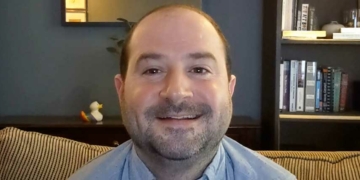

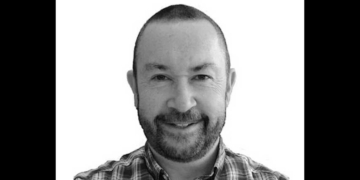









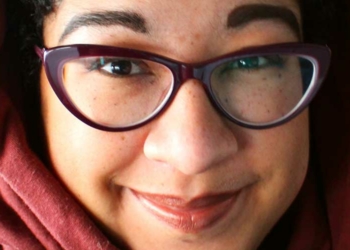





Comments
No comments yet, be the first to leave a comment.